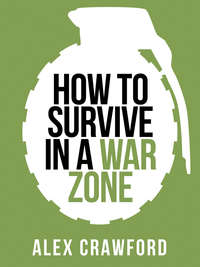Kitab fayl olaraq yüklənə bilməz, yalnız mobil tətbiq və ya onlayn olaraq veb saytımızda oxuna bilər.
Kitabı oxu: «How to Survive in a War Zone»


When the text comes I feel a rush of adrenalin.


John Ryley, the head of Sky News, never wastes words. But this is all I want to hear from him anyway. Great. We are off. Martin Smith, who is my cameraman, and I have already been on a whirlwind of Arab Spring stories, our feet barely touching the ground. Now it’s Libya. Colonel Gaddafi has been in power for forty-two years. He and his sons run the country like a personal fiefdom and he shows no sign of giving up despite the huge protest demonstrations calling for him to end his rule. It is a hugely exciting time to be a journalist, exhilarating to be at the centre of these huge events with big implications for the world. We all want to be there.

We’ve now been in Libya and working on this story for about eighteen hours and got precisely diddly squat from the Opposition. So far we haven’t seen a single rebel or anyone who will call themselves an Opposition fighter or supporter in public.
‘Why don’t we check out Zawiya?’ says Tim Miller, Sky’s Deputy Foreign Editor. Zawiya is fundamentally important to the regime because it’s not only home to one of the two most important oil refineries in the country, but it also straddles the road between the capital and the Tunisian border to the west. It is right on a vital supply route – so retaining control of Zawiya is imperative.
I agree. Zawiya is only about thirty miles away – a relatively short distance if it wasn’t for the many checkpoints. We breeze through the first few checkpoints. Then, as we get to the town’s perimeter, the atmosphere and mood at the checkpoints change. The checkpoints are much more heavy-duty, there are many more military personnel and there’s much more military hardware on show around the outskirts of the city.

‘No problem, no problem,’ says our driver. ‘Everything good.’ He takes us a circuitous route round the back, round the west, then the south.
Finally, we are inside. The streets are empty but we can hear the distant rumble of shouting – just a few seconds before we see a wave of people marching over the brow in the distance. Our driver stops. They are so far away I can’t quite work out what it is they are waving. Are they flags or weapons? And what flags are they marching under? Who are they?
Then, we see the rebels’ tricolour, the Libyan flag before Colonel Gaddafi’s coup in 1969, before he toppled King Idris and replaced it with his own all-green version. I jump out of the car at the same time as Martin is unravelling his legs and grabbing his camera gear. ‘Shall I stay with the taxi?’ says Tim. ‘No, take everything,’ I say. By this time the old man is very agitated. ‘No, no, come back. Danger, danger!’ he’s shouting. ‘It’s OK, don’t worry, we’re just going to see what’s happening.’
Pulsuz fraqment bitdi.
